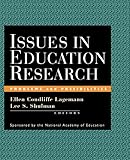Issues in education research : problems and possibilities
Tipo de material: TextoIdioma: Inglés Detalles de publicación: San Francisco : Jossey-Bass Publishers, 1999Edición: 1st edDescripción: xxix , 424 p. ; 25 cmISBN:
TextoIdioma: Inglés Detalles de publicación: San Francisco : Jossey-Bass Publishers, 1999Edición: 1st edDescripción: xxix , 424 p. ; 25 cmISBN: - 0787948101
- 370.7 I77
| Tipo de ítem | Biblioteca actual | Colección | Signatura | Copia número | Estado | Fecha de vencimiento | Código de barras | |
|---|---|---|---|---|---|---|---|---|
 Libro
Libro
|
Biblioteca Antiguo Cuscatlán | Colección General | 370.7 I77 1999 (Navegar estantería(Abre debajo)) | 001 | Disponible | 35056 | ||
 Libro
Libro
|
Biblioteca Antiguo Cuscatlán | Colección General | 370.7 I77 1999 (Navegar estantería(Abre debajo)) | 002 | Disponible | 35057 |
What is 'good' education research? What is 'less good' or even 'bad' education research? Shouid there be universal standards in this very broad and diverse domain of scholarly inquiry? If so, who shouid créate them? By what means? And if standards shouid and couid be formulated and agreed on, how shouid they be disseminated and enforced, and by whom? Not surprisingly, these questions provoked heated debate when they were raised at a meeting of the National Academy of Education (NAE) in the fall of 1991. The result, almost a decade later, is this collection, commissioned and reviewed by an NAE study group, the Commission on the Improvement of Education Research (CIER).1 NAE formed the commission in 1992 to review the current state of education research and to make recommendations for improvement. This book, Issues in Education Research: Problems and Possibilítíes, represents the first half of our assignment. A companion publication, intended to deal with the second half, will be available in the near future. Together they address what has always been, and will remain, central to the academy's purpose: improving education through the improvement of education research. The questions that led to this book were provoked by three matters of concern to the academy-concerns that are no less significant for the health of the field today than they were ten years ago. The first was how to safeguard the quality of the research being carried out. As a society of scholars and education leaders dedicated to the promotion of scholarship that can improve practice, policy, and public understanding of education in all its forms, NAE has fre-quently reviewed and commented on the state of education research. This was done thirty years ago in a volume that Lee J. Cronbach and Patrick Suppes edited, Research for Tomorrow's Schools: Dísciplined Inquíry for Education (Cronbach and Suppes, 1969). And with many studies in between, it was done most recently in a report of an NAE study group on funding priorities for education research, entitled Research and the Renewai of Education, led by Michael W. Kirst and Diane Ravitch and administered by Thomas James, Jr. (NAE, 1991). The second report called attention to some of the domains of practice and policy that have been significantly changed as a result of research carried out over the past ten or fifteen years. Among other things, it observed that progress in research-based knowledge was now jeopardized by serious declines in public and prívate support for research in education. While primarily calling for increased funding, the report recommended that efforts be made to ensure the continued high quality of education research (NAE 1991, p. 42). A second concern had to do with the state of American education. Follow-ing publication of A Nation al Risk in 1983, school reform became a top prior-ity for policymakers nationwide. Beginning with a somewhat monolithic push for 'excellence in education,' which usually meant a more streamiined curriculum, more homework, and higher achievement as measured by standard-ized tests, reform efforts diversified during the 1990s. Some groups emphasized systemic reform, others school-based innovations built around general principies. In some instances improved pedagogy was seen as essential, in others enriched curricula, and in still others more 'professional' teachers. If ever there was a time when evaluation and longitudinal studies of school change were needed, it is now. Historically school reform in the United States has been inter-mittent and cyclical. Too often eras of high expectations and significant change have ended in disillusionment. To prevent that occumng at the end of the twen-tieth century and to help ensure that this cycle of reform wouid be sustained, research seemed essential-'real' research, that is, to be distinguished from reports based merely on opinión, ideology, or personal experience. Finally there was recognition that the field was undergoing significant change. Studies in education are always defined by some combination of five attributes: purposes, problems, settings, investigators, and methods. Studies in education vary in the ways in which different scholars frame different problems to be investigated in different settings, reiying on a variety of methods that are intended to advance different particular purposes. Some studies are theoretical, some practical.
No hay comentarios en este titulo.

 2251-8215
2251-8215




